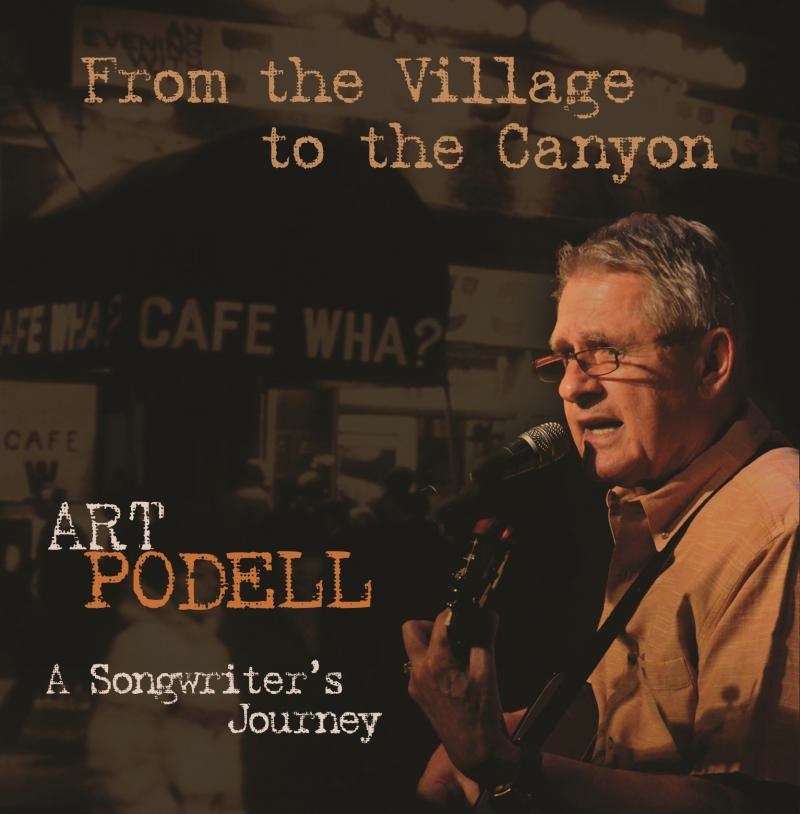
Art Podell
From the Village to the Canyon, A Songwriter’s Journey
(Amsqosh Records)
3.5 out of 5 stars
Videos by American Songwriter
Contemporary folk music has never really gone away. It’s been happening in living rooms, coffeehouses, college campuses and concerts since the late 1940s, released by small record labels and sometimes very large ones (and sometimes none at all). Every once in a while, it breaks into the mainstream, as it did most recently with the success of Mumford & Sons and the The Civil Wars, both of whom have enjoyed worldwide exposure and record sales and taken home numerous awards including a Grammy for Best Folk Album (for the Wars’ Barton Hollow album).
In 1958, it would have been difficult to win a Grammy for Best Folk Album (or best folk anything) because there was no folk music category in the awards program. It was the phenomenal popularity of San Francisco’s Kingston Trio, whose 1958 single, “Tom Dooley,” sold 3 million copies for Capitol Records, that is credited with rocketing folk music into the commercial mainstream, causing other record companies’ execs to sit up, take notice and start signing a lot of folk music groups.
Art Podell was a Greenwich Village folk singer in 1958. In the rush to capitalize on the folk boom, Columbia Records signed Podell and partner Paul Potash and, as the duo “Art & Paul,” they released two albums in 1960 and ’61, which are sought-after today by folk music aficionados.
The boom continued booming and Art & Paul headed west, where the action was. Though the duo did not survive in Los Angeles, Podell joined what was to become one of the biggest folk music troupes of the era.
The New Christy Minstrels was a ready-made group of 10 singers and players who performed pepped-up renditions of traditional folk numbers in their matching suits (most conspicuously for 26 consecutive Thursday nights on the 1962-63 season of “The Andy Williams Show”). Their 1962 debut album remained in the Billboard charts for two years and earned the group a Grammy for Best Performance by a Chorus. The folk life was good.
Though the Minstrels are known for their ever-shifting roster of members (which included, at one time or another, Barry “Eve of Destruction” McGuire, Kenny Rogers, Kim Carnes, and the aforementioned Paul Potash), Podell remained steady with the group from the beginning through to the peak and down the other side, when the times, they a-changed and the boom stopped booming.
The shift in folk music, toward protest and social conscience, had something to do with the decline of “pop folk” groups like the Minstrels, as did “Sergeant Pepper’s boys,” as Podell acknowledges in the song “Toni’s Poem (Laurel Canyon).” He exited the group in the mid-sixties.
Podell may not have been very active in music in the intervening years, but From the Village to the Canyon is proof that there is no such thing as a former gypsy; Podell’s gypsy heart beats strongly throughout these songs; he enchants with his whispery rasp and references to “Ms. Simone,” Carole King and “a murder.”
The “village” is represented by the uptempo folk and country of “Song for Dink,” “We Sang Our Songs in California” and “She Came Back,” while much of the balance has the singer-songwriter feel often associated with “the canyon.” (That’s Laurel Canyon, a neighborhood in the Hollywood Hills in Los Angeles which was home to many singer-songwriters, rock musicians, etc. in the 1960s and ’70s.)
Podell’s musical palate covers a good range, from the gentle picking and solo vocal of “But Then You Smile” to the banjo and foot stomp of “Dink” to the darkness and mystery of “Time and the River” and “Golden Apples” (the latter of which, with its cello and piquant dissonance, sounds like it could have been on side one of Love’s Forever Changes, sans that album’s psychedelic eeriness).
From the Village to the Canyon is a love letter to the people and places (and a dog) of Podell’s life, both musical and otherwise, written in the intimate language that exists between people who have a shared history, but it is also the yellow-lit windows of a home with an open door, welcoming you, wayfaring stranger, out of the cold, in to the gathering, and reminding you of what’s important.













Leave a Reply
Only members can comment. Become a member. Already a member? Log in.